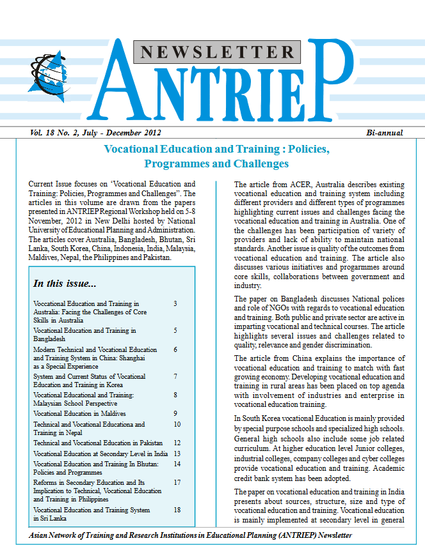
Article
Vocational education and training in Australia : facing the challenges of core skills in Australia
ANTRIEP Newsletter
(2012)
Abstract
The Australian vocational education and training (VET) sector is responsible for education and training for work. It has a well-established national system of endorsed and accredited training and curriculum through training packages. There is a national qualifications framework which applies across the different tertiary sectors (higher and VET) through the Australian Qualifications Framework, and qualifications are transportable across states and sectors. There is industry input and co-ordination to training/training packages through industry skills councils. The qualifications undergo regular reviews and there are nationally agreed standards for training organisations. There are a variety of providers, called Registered Training Organisations (RTOs); these can be public, enterprise and private, ranging from almost 60 large public TAFE institutes to small public community organisations and approximately 3,000 private RTOs. A number of current issues and challenges face VET in Australia. (1) Due to the number of providers, it is difficult to implement national standards and to monitor the quality of providers and training delivered. (2) In relation to funding, there have been significant recent moves to make VET provision a market-driven level playing field with contestable funding with learners having an 'entitlement' to study, and with differing criteria across states. (3) Another current challenge relates to the quality of outcomes from VET. Related to this is the issue of quality of assessment practices in a historically competency-based system. (4) Other concerns are the low completion rates from VET, and the capacity and expertise of the VET workforce, which is ageing, and the minimum qualification standard for teaching and training in VET. One example of a new and co-ordinated program of VET delivery is the development of programs around core skills, also known as foundation skills. These include adult language, literacy and numeracy (LLN) skills and employability skills. Government and industry have argued for LLN skills and the need for these to be addressed on a national basis. In the past two years the following initiatives have been introduced: release of a National Foundation Skills Strategy for Adults; new frameworks for core skills covering LLN and employability; release of new LLN qualifications for VET trainers; and the release of a new Foundation Skills Training Package as part of a national systemic approach to developing these skills.
Keywords
- Adults,
- Language literacy numeracy,
- LLN,
- Core skills,
- Vocational education and training,
- VET
Disciplines
Publication Date
2012
Citation Information
Dave Tout. "Vocational education and training in Australia : facing the challenges of core skills in Australia" ANTRIEP Newsletter Vol. 18 Iss. 2 (2012) Available at: http://works.bepress.com/dave_tout/39/
